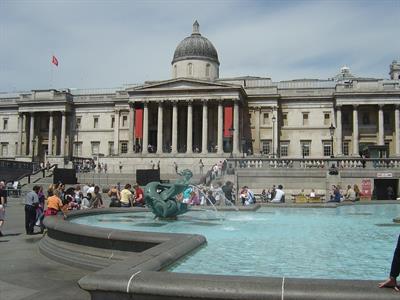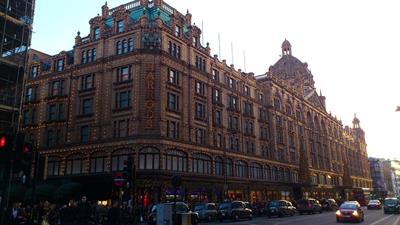Watch the next part of the video. Then read and learn about the British Museum and Harrod's Department Store.
(Noskaties nākamo video daļu! Tad lasi un mācies par Britu muzeju un Harrods universālveikalu!)
- The British Museum
The British Museum, in the Bloomsbury area of London, is a public institution dedicated to human history, art and culture. Its permanent collection of some eight million works is among the largest and most comprehensive in existence, having been widely sourced during the era of the British Empire. It documents the story of human culture from its beginnings to the present. It was the first public national museum in the world.
The British Museum was established in 1753, largely based on the collections of the Irish physician and scientist Sir Hans Sloane. It first opened to the public in 1759, in Montagu House, on the site of the current building. Its expansion over the following 250 years was largely a result of expanding British colonisation and has resulted in the creation of several branch institutions, the first being the Natural History Museum in 1881.
By the last years of the 19th century, The British Museum's collections had increased to the extent that its building was no longer large enough. In 1895 the trustees purchased the 69 houses surrounding the museum with the intention of demolishing them and building around the west, north and east sides of the museum. The first stage was the construction of the northern wing beginning 1906.
Today the original 1753 collection has grown to over 13 million objects at the British Museum, 70 million at the Natural History Museum and 150 million at the British Library.

British Museum — [ˈbrɪt.ɪʃ.mjuːˈziː.əm] — Britu muzejs
- Harrod's Department Store
Harrod's is a department store located on Brompton Road in Knightsbridge, London. The store occupies a 2 ha site and has 330 departments covering 0.1 million m² of retail space. It is the largest department store in Europe.
In 1849 Charles Henry Harrod took over a small shop in the district of Brompton, on the site of the current store. Beginning in a single room employing two assistants and a messenger boy, Harrod's son Charles Digby Harrod built the business into a thriving retail operation selling medicines, perfumes, stationery, fruits and vegetables. Harrods rapidly expanded, acquired the adjoining buildings, and employed one hundred people by 1881.
However, the store's booming fortunes were reversed in early December 1883, when it burnt to the ground. Remarkably, Charles Harrod fulfilled all of his commitments to his customers to make Christmas deliveries that year—and made a record profit in the process. In short order, a new building was built on the same site, and soon Harrods extended credit for the first time to its best customers, among them Oscar Wilde, Lillie Langtry, Ellen Terry, Charlie Chaplin, Noël Coward, Gertrude Lawrence, Laurence Olivier and Vivien Leigh, Sigmund Freud, A. A. Milne, and many members of the British Royal Family.

Harrod's Department store — [ˈhæ.rɒdzˌdɪˈpɑːt.mənt ˌstɔːr] — Harrods universālveikals
Atsauce:
https://www.youtube.com/watch?v=qaBZPI7If14
https://www.visitlondon.com/